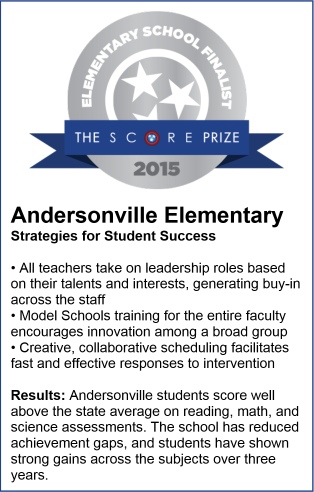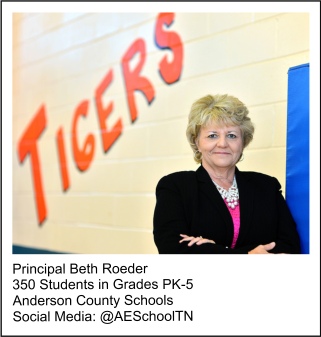Breakfast is a social time at Andersonville Elementary, a 2015 SCORE Prize finalist school. Volunteers from a nearby church – many of whom are retirees – stop by first thing each morning to eat breakfast with the kids, open cartons of milk, and chat about the day ahead.
“It’s the easiest thing to do. It costs no money. And it’s made a big impact – not just on academics, but the whole child,” said Hope Holdaway, a third-grade Andersonville teacher who helps lead the initiative.
The program, called Breakfast Buddies, is one of many efforts at Andersonville led by teachers. In fact, Principal Beth Roeder’s expectation is that every teacher takes on some form of leadership role. Depending on individual teachers’ interests and experience, this can mean taking charge of aspects of curriculum or data, rethinking playground safety, planning the school Christmas program, or helping out in the c entral office. And all this is in addition to a school structure that gives teachers a key role in decision-making and development of fresh interventions.
entral office. And all this is in addition to a school structure that gives teachers a key role in decision-making and development of fresh interventions.
Ms. Roeder said it’s taken a few years for the current workflow to evolve – this is not something to introduce quickly or to attempt without knowing staff well. The result is a faculty culture of shared buy-in and high expectations, and a school rich in innovation.
“The expectations are so high that we almost have peer pressure. It’s not me. It’s the staff,” said Ms. Roeder. “The more confidence you give your teachers, the more confident they feel that they can do something. No one can do it all by yourself, and you can’t do a great job if you’re trying to do it all by yourself.’”
Teachers have created and implemented a school-wide disciplinary plan that is consistent in every classroom. All teachers mentor one another, spending time observing one another’s classrooms to provide feedback and learn from what works. Teacher-designed creative scheduling facilitates more interventions for students. For example, the music teacher figured out a way to take on the entire fourth grade during one class session, allowing teachers to have an extra common planning period. This, in turn, has allowed for more enrichment activities for the school’s highest performers.
Another teacher-initiated effort that made a big difference was the departmentalization of fourth and fifth grades. With permission from the district, teachers in these grades specialized based on subject matter, and kids rotate between classes during the day.
“That has made a huge difference for us here,” Ms. Roeder said. “Teachers are no longer making six lesson plans each day and differentiating within that.”
A new program at the school this year applies Carol Dweck’s “growth mindset” research in a personal development effort for students. Finding great inspiration in the idea that traits like motivation and perseverance drive academic growth, teachers have identified a key personal trait to focus on each month and built reinforcement of those characteristics into school life. A monthly assembly focuses on each trait. Plastic wristbands with different values are worn by teachers all day, and when students demonstrate these traits, they get a wristband to wear.
The idea came from sessions attended at the 2015 Model Schools Conference, an initiative of the International Center for Leadership in Education. Rather than send just a few to the well-regarded event, Ms. Roeder and the Andersonville community worked hard to enable almost all of the faculty to attend for the past two years. Registration fees alone were nearly $500 for each participant, making this no small investment. With the help of the PTA, the money was raised through sales of doughnuts, trash bags, and anything else they could come up with. Teachers used their own time for the event and covered their own travel and lodging expenses.
“It’s expensive, but worth it,” said Ms. Roeder.
Many of the school’s recent innovations started with Model Schools sessions and ideas. The conference also has provided an opportunity for Andersonville to learn from other schools, a practice that the school continues throughout the year. Teachers participate in weekly planned learning communities (PLCs) during a weekly early dismissal time for students, and those PLCs regularly meet to cross-plan and share ideas with teachers at other nearby elementary schools, including 2011 SCORE Prize winner Fairview Elementary. An upcoming session has  Andersonville and Fairview teachers working together to discuss classroom preparations for TNReady assessments. Rather than working with a strict agenda set by administrators, teachers play a large role in determining material to cover.
Andersonville and Fairview teachers working together to discuss classroom preparations for TNReady assessments. Rather than working with a strict agenda set by administrators, teachers play a large role in determining material to cover.
“Those PLCs have definitely correlated to a lot of our success,” said Ms. Holdaway. “We love to find out about what works in other schools, which we don’t often get to do as teachers. Teaching can be very isolating at times. Even though you’re in a whole school of educators, the time you actually spend with them is very limited.”
The positive environment at Andersonville extends beyond the staff. Fourth-grade student Eberle Mayes says her teachers make Andersonville Elementary is a great place to learn.
“If I’ve struggled, they’ve just gone right back and helped me understand it,” Eberle said. “You need teachers that understand your problems if you have any problems, and our teachers are really like that. If you don’t feel good, people will know, because they just know all their kids.”
And according to Ms. Holdaway, her school really shines when the empowering confidence felt by teachers is directed toward families.
“When people walk in this building, they immediately feel welcome. Once you get your parents feeling safe and welcome, something very magic happens,” Ms. Holdaway said. “We find our parents and exploit their talents, so to speak, because everyone has something to give.”
Learn more about the work at Andersonville Elementary in this video:
